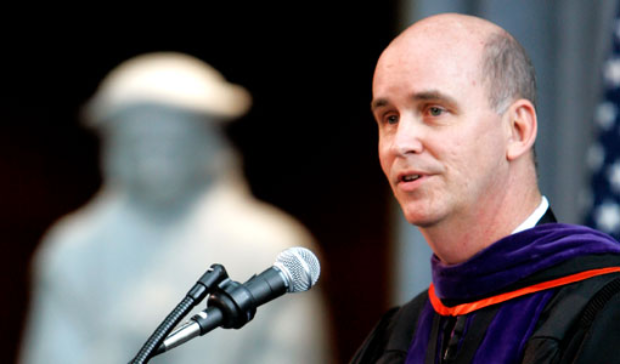In late October, former Federal Reserve Chairman Alan Greenspan testified before Congress, “We are in the midst of a once-in-a-century credit tsunami.” Essentially we have a catastrophic failure of our financial sector to the degree that in mid-September, Connecticut Senator Chris Dodd paraphrased warnings from the Treasury and the Federal Reserve that “we are literally maybe days away from a complete meltdown of our financial system.” This catastrophic failure has triggered a worldwide recession of unknown depth and duration.
Failures of Prudence
There were early warnings. For example, in February 2002, CEO Warren Buffett’s annual letter to Berkshire Hathaway shareholders cautioned, “We view [derivatives and the trading activities that go with them] as time bombs, both for the parties that deal in them and for the economic system.”
This catastrophic failure was foreseeable. While investigations will uncover fraud, this failure is not principally the result of criminal wrongdoing. Rather it is clear that many of our private financial sector and public sector leaders failed with respect to the virtue of prudence. Prudence (from the Latin word, prudentia, meaning “foresight”) is the ability to discern sensible and right action in the circumstances of a given time and place using foresight, reason and self-control.
The virtue of prudence also calls on private financial sector and public leaders whose judgment is proved, after the fact, to have been imprudent, to acknowledge mistakes, learn from them and make amends. Put another way, leadership is about having directing authority or influence over others, but ethical leadership that embodies the virtue of prudence will exercise the authority or influence using foresight, reason and self-control, including the habit of self-assessment – taking feedback and reflecting on decisions, particularly mistakes, to learn from them and make amends. Ethical leadership sees a “once-in-a-century credit tsunami” as a once-in-a-century opportunity to learn to do better in the future.
Our private financial sector and public leaders include people with either formal directing authority or significant influence (or both) on the financial sector. Members of the legal profession dominate leadership in the public sector, constituting 59 percent of all presidents, 45 percent of Congress from 1960-2004 and 100 percent of the judicial branch. They also occupy positions of substantial influence in the private sector, including 10 percent of the CEOs of S&P 500 companies and all the general counsel positions.
Our private financial sector and public sector leaders, including many members of the legal profession, have made catastrophic mistakes of foresight, reason and self-control imposing worldwide pain on others, but virtually none of them is publicly undertaking any self-assessment about their responsibility. Virtually all leaders are claiming it is someone else’s fault. They are compounding their failures of prudence.
Societal Response to the Catastrophe
Our societal response to date is focused on ameliorating the widespread failure of trust in the financial sector through a bailout of the sector in the hope this will restore the functioning of the credit markets and mitigate the recession. The second step will be regulatory reform of the financial sector to use government to cabin the worst private sector excesses contributing to this disaster.
A third critical step the public expects is self-assessment to learn from and make amends for mistakes. Public-sector leaders must undertake a self-assessment of their own failures of prudence. And regardless of the government’s regulatory response, private financial sector leaders, including leaders in business and the gate-keeping professions of law and accounting, should undertake self-assessment.
In my view, many of the failures of prudence in both sectors are not amenable to government regulation, but are the result of a cultural failure of excessive emphasis on short-term self-interest at the expense of what Thomas Reid called “self-interest considered upon the whole.” Reid, who in 1766 followed Adam Smith as the chair of moral philosophy at the University of Glasgow, used that phrase to emphasize the ethical foundations underpinning the market that lead to trust in an enterprise and the market itself. When trust is lost, a market’s or an enterprise’s ability to transact business is substantially damaged. Excessive short-term self-interest undermines foresight, reason and self-control as well as habits of self-assessment, and it leads to a loss of trust.
I believe our cultural institutions are failing substantially at socializing our leaders in business, the professions and government into an ethical professional identity, including “self-interest considered upon the whole,” and the virtue of prudence. Education, including graduate education, should undertake its own self-assessment of the socialization of our public and private sector leaders to learn from this once-in-a century catastrophe.
The Ethical Leadership Mission of the University of St. Thomas
The mission of the University of St. Thomas is to educate students and the community to be morally responsible leaders for the common good. The university should lead higher education on a self-assessment of the failure of prudence in the current catastrophe and what changes in higher education the self-assessment suggests.
The university’s various centers and institutes are planning public programs this spring related to the current catastrophe and how we can learn from it and move forward with morally responsible leadership. (Event details are available at www.stthomas.edu/ethicalleadership.)
© Neil Hamilton, professor of law and director of the Holloran Center for Ethical Leadership in the Professions. A significant portion of this article first appeared in an article in the Dec. 15, 2008, Minnesota Lawyer.
Read more from St. Thomas Lawyer.




